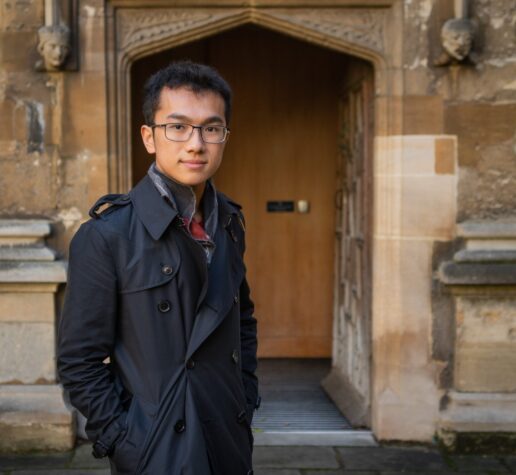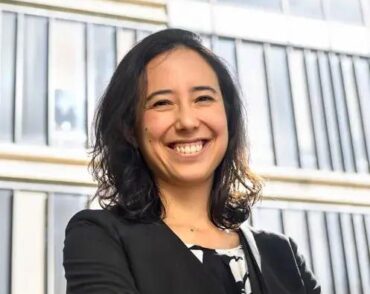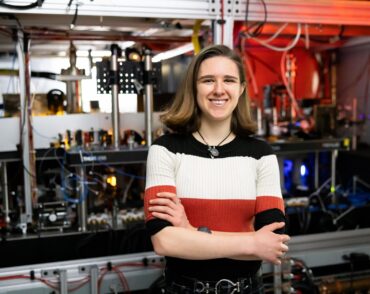
From modeling quantum devices to political systems
Senior Sihao Huang uses his background in physics and complex systems to inform his interdisciplinary approach to political science.
When most students are 17, they’re preparing college applications and planning for prom. When Sihao Huang was 17, he was meeting with officials from the U.S. Department of Defense and the Federal Aviation Administration. For two years before arriving at MIT, Huang started and ran a company, designing small, customizable satellite modules. Huang, now a college senior double majoring in physics and electrical engineering and computer science, is as enterprising and curious as ever, and he still spends his time thinking about complex physics models and how to engineer better systems. But these days, what interests him isn’t satellite systems, but political ones.
During his childhood in China and Singapore, Huang taught himself electrical engineering and coding and started building circuit boards in his bedroom. At 14, when his family moved to the United States, he set off on a personal mission to launch something into space. Huang co-founded a company, Aphelion Orbitals, which he ran for three years. During that time, he recruited engineers from aerospace companies to design modular launch vehicles and propulsion systems to help make sending satellites into space accessible to more people.
Huang realized, though, that the real challenge for him in owning the company wasn’t the engineering; it was the people and business side of things. “I think I needed to grow more as a person before I could grow the company more,” he says of his decision to attend college. “It was so much more than just assembling parts.”
That early exposure to business, and its inherent challenges, remained in his mind as Huang arrived at MIT and began studying physics and engineering. It didn’t take long to realize that, for him, the most intriguing systems weren’t found in the natural sciences, but in the social sciences.
“Human systems are immensely complex,” Huang says, describing his interest in political science. “It’s a very difficult problem, far more difficult than understanding the arrangement of atoms in a lattice. But the impact on human life, from building more equitable societies to more responsive governments, is enormous.”
Surprisingly, Huang’s growing interest in politics was inspired, in part, by his research experience in the Engineering Quantum Systems Group for his first two years at MIT.
“That was an amazing experience,” Huang says of his time in the lab. His work taught him how to perform research and write papers and helped him fall in love with the process. It also exposed him to a wide variety of different ideas and fields of research.
“I think it’s really a special MIT thing that there’s such an interdisciplinary, that you have people talking about everything from philosophy to economics in a quantum computing lab, and doing world-class research on both subjects,” Huang says.
It was near the end of his second year that Huang met Alex Siegenfeld, a doctoral student in physics who was doing research in the Media Lab. Siegenfeld published a paper in Nature Physics in early 2020 using statistical models to understand instability in political elections. For Huang, reading that paper was revolutionary, and it provided a direct bridge between his long-standing curiosity about physics and growing interest in politics. Huang started working with Siegenfeld, attempting to expand his theories about single elections to systems of elections that interact and influence each other.
Huang describes this kind of emerging field of research as complex systems science, research on which was awarded the Nobel Prize in Physics in 2021. “I was really happy about it,” Huang jokes of the Nobel announcement. “I can finally talk about complex systems science without people going, ‘What is that?’”
Huang’s approach to complex systems is about using insights and tools from engineering and physics to understand social systems. He sees the value in this approach as two-fold. First, it helps researchers see political institutions not as static objects, but as systems that constantly interact and evolve over space and time. Thinking about institutions as “learning organizations,” as Huang describes them, can provide innovative solutions to political problems. In addition, insights from physics and engineering can provide new tools and techniques for political science like graph theory and machine learning. “These things can help us build more quantitative, bottom-up models of politics,” Huang argues.
To expand his understanding of political science, though, Huang has sought opportunities to step outside of his quantitative comfort zone. His junior year, he took 17.407 (Chinese Foreign Policy) with Taylor Fravel, a professor of political science and director of the MIT Security Studies Program. In Fravel’s class, Huang got a taste for more traditional political science, using historical documents and interviews to understand the foreign policy impacts of China’s Belt and Road Initiative, a large-scale regional development project.
“I interviewed an ambassador at one point, worked on understanding China’s diplomatic strategy, and did a lot of qualitative research,” Huang says of his work with Fravel, which helped him to declare a minor in political science. “That was a completely different side of political science for me, and I was grateful to have people welcome me from the opposite corner of the Institute.”
Huang believes that his experience doing research on both ends of the spectrum — from his highly physics-oriented work with Siegenfeld to the historical approach of Fravel — has been essential to his development as a researcher.
“They absolutely have to be integrated together,” Huang says of the two approaches. “You have to be cautious applying these very quantitative methods to social systems.” Yet, he adds, a complex systems approach can provide valuable insight and rigor to social science research if the work is grounded in political reality and accounts for subjectivity.
Huang’s commitment to understanding all facets of the field has now taken him more than 3,000 miles away. This year, he’s studying abroad at Oxford University in their philosophy, politics, and economics program. “I wanted to be exposed to a very different way of thinking,” Huang says of his decision to go to Oxford. That global thinking will continue as he pursues a graduate degree as a 2023 Schwarzman Scholar at Tsinghua University in Beijing
As he has been at MIT, Huang is committed to interdisciplinarity during his time abroad, studying both condensed matter physics and political movements. For some, that might seem like an odd pairing. Huang explains, though, that condensed matter is just an assortment of different, strongly interacting constituents, just like social systems. So it turns out that physics and politics may not be so different after all.


